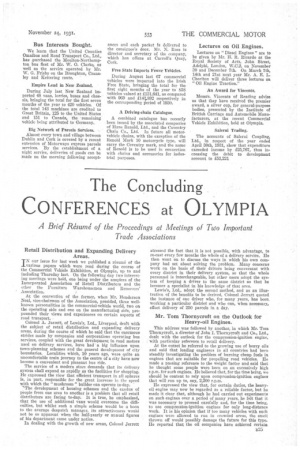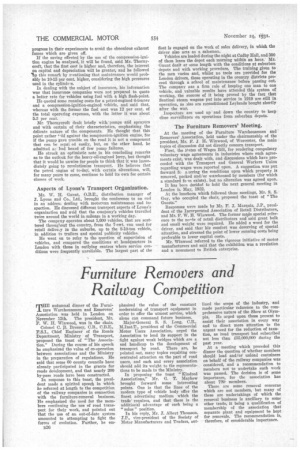The Concluding
Page 43

Page 44

If you've noticed an error in this article please click here to report it so we can fix it.
CONFERENCES at OLYMPIA
A Brief Resume' of the Proceedings at Meetings of Two Important Trade Associations
Retail Distribution and Expanding Delivery Areas.
TN our issue for last week we published a résumé of the 'various papers which were read during the course of the Commercial Vehicle Exhibition, at Olympia, up to and including Thursday last. On the following day two interesting meetings were held, one being under the auspices of the Incorporated Association of Retail Distributors and the other the Furniture Warehousemen and Removers' Association. 0 At the convention of the former, when Mr. Henderson Neal, vice-chairman of the Association, presided, three wellknown personalities in the commercial-vehicle world, two on the operating side and one on the manufacturing side, propounded their views and experiences on certain aspects of road transport.
Colonel A. Jerrett, of Lewis's, Ltd., Liverpool, dealt with the subject of retail distribution and expanding delivery areas, during the course of which he said that the enormous strides made by companies and corporations operating bus services, coupled with the great development in road motors used on delivery services, have had a big influence upon town-planning schemes and the general development of city boundaries. Localities which, 10 years ago, were quite an uncomfortable train journey to the centre of a city have now become a convenient and pleasant bus ride.
The service of a modern store demands that its delivery system shall expand as rapidly as the facilities for shopping. lie expressed the view that efficient transport in all spheres is, in part, responsible for the great increase in the speed with which the " mushroom " builder can operate to-day. ' -'‘The development of housing schemes and the exodus of people from one area to another is a problem that all retail distributors are facing to-day. It is true, he emphasized, that the use of additional vans would overcome the difficulties, but whilst such a simple scheme would be a boon to the average despatch manager, its attractiveness would not be so apparent when the hall-yearly or annual figures of his department came under notice.
In dealing with the growth of new areas, Colonel Jerrett
stressed the fact that it is not possible, with advantage, to re-cast every few months the whole of a delivery service.. He then went on to discuss the ways in which his own company had set about solving the problem. Many concerns work on the basis of their drivers being conversant with every district in their delivery system, so that the whole personnel is interchangeable, but other users adopt the system of keeping a driver to the same district so that he becomes a specialist in his knowledge of that area.
Lewis's, Ltd., adapt the second method, and as an illustration of the benefits to be derived, Colonel Jerrett quoted the instance of one driver who, for many years, has been. working a particular district and who can, when necessary, effect delivery of 250 parcels in a day.
Mr. Tom Thornycroft on the Outlook for Heavy-oil Engines.
This address was followed by another, in which Mr. Tom Thornycroft, a director of John I. Thornycroft and Co., Ltd., dealt with the outlook for the compression-ignition engine, with particular reference to retail delivery.
At the outset he referred to the growing use of heavy oils and said that leading engineers in all countries had been steadily investigating the problem of burning cheap fuels in engines that are suitable for propelling road vehicles. Be made a passing reference to the weight factor and said that he thought some people were keen on an excessively high r.p.m. for such engines. Ife believed that, for the time being, we should be content to rely upon compression-ignition engines that will run up to, say, 2,200 r.p.m.
He expressed the view that, for certain duties, the heavyoil engine may now be regarded as a reliable factor, but he made it clear that, although he had carried out experiments on such engines over a period of many years, he felt that it was necessary to proceed carefully and, for the time being, to use compression-ignition engines for only long-distance work. It is his opinion that if too many vehicles with such engines were allowed to run in crowded areas, the smell thrown off would possibly damage the future for this type. Ile reported that the oil companies have achieved certain progress in their experiments to avoid the obnoxious exhaust fumes which are given off.
If the saving effected by the use of the compression-ignition engine be analysed, it will be found, said Mr. Thornycroft, that the first cost is higher and, therefore, the interest on capital and depreciation will be greater, and he followed lap this remark by r-entioning that maintenance would probably be 10-15 per cent, higher, considering the high pressures used in the cylinda..s.
In dealing with the subject of insurance, his information was that insurance companies were not prepared to quote a better rate for vehicles using fuel with a high flash-point. He quoted some running costs for a petrol-engined 6-tonner and a compression-ignition-engined vehicle, and said that, whereas with the former the fuel cost was 12 per cent, of the total operating expenses, with the latter it was about 5.3 per cent.
Mr. Thornycroft dealt briefly with pumps and sprayers and with certain of their characteristies, emphasizing the delicate nature of the components. He thought that this point rather *ald against the compression-ignition engine, for if the pump gave trouble on the road it is not a component that can be repo', ed easily, but, on the other hand, he admitted it2. had heard of few pump failures.
He struck an optimistic note in his concluding remarks as to the outlook for the heavy-oil-engined lorry, but thought that it would be unwise for people to think that it was immediately going to revolutionize transport. He believes that the petrol engine of to-day, with certain alterations, will, for many years to come, continue to hold its own for certain classes of work.
Aspects of Lyons's Transport Organization.
Mr. W. H. Gaunt, 0.B.E., distribution manager of J. Lyons and Co., Ltd., brought the conference to an end in an addres:, dealing with motorvan maintenance and inspection. He discussed different transport aspects of Lyons's organization and slid that the company's vehicles travelled twice around the world in mileage in a 'working day.
The compeny operates about 1,600 vehicles, that are scattered throueiout the country, from the 7-cwt. van used for retail delive,y in the suburbs, up to the 8-10-ton vehicle, in addition to trailers and special publicity vehicles.
Be went on to refer to the question of supervision of vehicles, and compared the conditions at headquarters in London with those in outlying centres where service conditions were frequently unreliable. The largest part of the fleet is engaged on the work of sales delivery, in which the driver also acts as a salesman.
Vehicles are loaded during the night at Cadby Hall, and 300 of them leave the depot each morning within an hour. Mr. Gaunt dealt at some length with the conditions at suburban depots and with working procedure. The training given to the men varies and, whilst no tools are provided for the London drivers, those operating in the country districts proceed through a school of maintenance before passing out. The company nas a firm rule of keeping one man to one vehicle, and valuable results have attended this system of working, the succass of it being proved by the fact that Sentinel steam wagons put into service in 1919 are still in operation, as also are reconditioned Leylands bought shortly after the war.
Inspectors are used up and down the country to keep dose surveillance on operations from suburban depots.
The Furniture Removers' Meeting.
At the meeting of the Furniture Warehousemen and Removers' Association, held under the chairmanship of the president, Mr. F. J H. Winwood, of Worcester, the main topics of discussion did not directly concern transport.
First, the ,ttates of Wages Bill, for rendering compulsory voluntary wage agreements in industries where such agreements exist, was dealt with, and discussions which have proceeded with the Transport and General Workers Union regarding wages were reported upon. A suggestion was put forward ft, aaering the conditions upon which property is removed, packed and/or warehoused by members (for which a standard fo'm exists), but no alteration was agreed upon.
It has beim decided to hold the next general meeting in London ii May, 1932. At the luncheon which followed these meetings, Mr. S. S.Guy, who occupied the chair, proposed the toast of "The Guests."
Responses were made by Mr. F. J. Marquis, J.P. president of the Incorporated Association of Retail Distributors, and Mr. P. W. B. Winwood. The former map special reference to the needs of retail distributors and said great bulk and small weight were required. He added a word for the driver, and said that his comfort was deserving of special attention, and stressed the point of lower running costs being preferable to lower capital costs. Mr. Winwood referred to the vigorous initiative of motor manufacturers and said that the exhibition was a revelation and a monument to British enterprise.




































































































